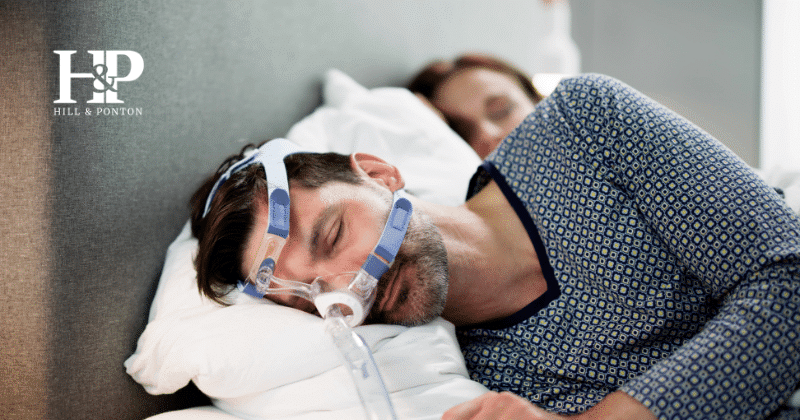Sleep apnea, particularly Obstructive Sleep Apnea (OSA), is a significant concern for many veterans, with over a half a million veterans service-connected for the condition. It’s a condition where breathing repeatedly stops and starts during sleep, leading to various health issues.
For those who’ve served in the military, the rigors and stresses of service can often exacerbate or contribute to this condition. Here’s how VA rates sleep apnea and how you can maximize your VA benefits.
The VA Disability Ratings for Sleep Apnea
Under the VA Ratings Schedule, a veteran with sleep apnea may be entitled to 0%, 30%, 50% or 100% benefits for sleep apnea, as follows:
- 0% Rating: Diagnosis without significant symptoms or required treatment.
- 30% Rating: Daytime sleepiness impacting daily activities.
- 50% Rating: Prescription of a CPAP or other breathing assistance is required.
- 100% Rating: Severe cases with complications like heart issues.
VA Claims Denied?
Your Fight is Our Mission
The most common ratings for sleep apnea in veterans is 30% or 50% if a CPAP is required. But you can also connect this very common disorder to other related conditions.
CPAP VA Rating
Veterans diagnosed with service-connected sleep apnea and who require the use of a CPAP (Continuous Positive Airway Pressure) machine are generally assigned a 50% disability rating. This rating reflects the impact of sleep apnea on a veteran’s daily life and health, particularly when CPAP is needed to maintain proper breathing during sleep. The 50% rating entitles veterans to monthly compensation (currently $1,102.04/month in 2025), in addition to healthcare services related to the condition.
Recent VA proposals suggest modernizing the evaluation criteria for sleep apnea with a cpap rating, considering how well symptoms are managed with treatment. Under these proposed changes, veterans who are fully treated by a CPAP or other breathing assistance devices may receive a 0% rating if the treatment fully eliminates the symptoms.
However, if symptoms persist despite treatment, veterans could qualify for progressively higher ratings. These changes are still in the proposal stage and will not impact veterans currently receiving compensation unless finalized after public comment.
Winning Case Example: Rating for CPAP
In this case, a veteran sought an increased disability rating for his sarcoidosis and sleep apnea. The veteran was using a CPAP machine to treat his obstructive sleep apnea (OSA) and argued that his condition warranted a higher disability rating. The Board of Veterans’ Appeals reviewed the evidence and ultimately awarded a 60% disability rating, up from the previously assigned 50%, due to the severity of his condition from February 16, 2016, forward.
The Board granted a 60% disability rating for sarcoidosis/sleep apnea effective from February 16, 2016. However, the veteran’s request for a higher rating (in excess of 50%) prior to this date was denied. The veteran’s use of a CPAP machine was a critical factor in the 50% rating, but the increase to 60% was based on more severe pulmonary function test (PFT) results in 2016.
Key Factors That Contributed to Winning the Claim:
- The veteran used a CPAP machine regularly to treat his sleep apnea. Under Diagnostic Code 6847, the use of a CPAP machine warrants a 50% disability rating. This was recognized as early as January 2010, when the CPAP machine was prescribed.
- The veteran’s February 2016 PFT results were significant in securing a higher rating. His DLCO (a measure of lung function) dropped to 55%, which meets the criteria for a 60% disability rating under Diagnostic Code 6600.
- The Board noted the veteran’s credible lay statements, including testimony from a Board hearing, where he described his dependency on the CPAP machine and the challenges he faced without it. These statements, alongside his medical records, solidified the claim.
Why the Veteran Did Not Qualify for a 100% Rating:
- The veteran did not exhibit chronic respiratory failure with carbon dioxide retention or cor pulmonale (right-sided heart failure), which are required for a 100% disability rating under Diagnostic Code 6847.
- The veteran did not require a tracheostomy, which is another criterion for a 100% rating under the code for sleep apnea.
This case highlights the importance of providing both medical and lay evidence when seeking a higher disability rating for sleep apnea requiring a CPAP machine. While a CPAP machine alone may warrant a 50% rating, more severe symptoms, such as declining lung function, can lead to a higher rating. In this case, the veteran successfully secured a 60% rating by demonstrating a worsening of his condition.
Get a Better VA Rating for Sleep Apnea by Connecting Secondary Conditions
Many veterans experience other health issues that can either contribute to or worsen their sleep apnea. Recognizing and proving these connections can significantly impact your VA rating.
Conditions Linked to OSA
- PTSD
- Hypertension
- Depression and Anxiety Disorders
- Chronic Pain
- Diabetes Mellitus
- Asthma and other respiratory conditions
- Traumatic Brain Injury (TBI)
- Gastroesophageal Reflux Disease (GERD)
- Obesity
- Neck or Upper Airway Injuries
- Sinusitis or Rhinitis
- Exposure to Toxic Substances or Environmental Hazards
- Chronic Fatigue Syndrome
- Migraines and Headaches
- Heart Conditions
Is Sleep Apnea a Presumptive Condition?
Someone who served in Iraq may ask themselves: is sleep apnea a presumptive condition for burn pit exposure? Unfortunately, no, sleep apnea is not automatically service connected for anyone, including Gulf War veterans.
Sleep apnea is not considered a presumptive condition by VA. This means veterans must provide evidence that their sleep apnea is connected to their service. Documents like service treatment records, medical nexus letters and buddy statements can help accomplish this.
How do I Connect Sleep Apnea to my Military Service?
If your symptoms manifested in service, providing a buddy statement or showing you had treatment for a sleep disorder during service can prove this. But when your sleep apnea is secondary to another service-connected condition, you would likely need to provide a medical nexus to link between the two conditions.
Toxic exposure can cause chronic inflammation and damage to the airway, leading to obstructive sleep apnea. There is evidence that suggests conditions prevalent among Gulf War veterans, such as exposure to toxic substances from burn pits and other environmental hazards, can exacerbate sleep apnea. If they can demonstrate that the sleep apnea was caused or aggravated by their time in service, they will be able to get it service-connected for benefits.
VA is presently considering changes that may continue to expand the list of presumptive conditions related to toxic exposures and could potentially include sleep apnea. This would make it easier for veterans who are considering linking it to service-related toxic exposure.
Case Example
A veteran who served in Southwest Asia during the Persian Gulf War sought (and won) service connection for sleep apnea. He claimed it was caused by environmental exposures during his Gulf War service.
Evidence That Helped Win This Claim
- A sleep study diagnosing severe sleep apnea
- Statement from ex-girlfriend noting sleep apnea symptoms
- Medical opinion linking sleep apnea to military service and chemical exposures
- Medical treatise linking organic solvent exposure to sleep disorders
- Veteran’s testimony
How Do I Win My Sleep Apnea VA Claim?
Maximizing your VA rating should involve a personalized and strategic approach to connecting secondary conditions to your primary diagnosis of OSA based on your personal medical history. Here’s how you can bolster your claim:
- Gather Comprehensive Medical Evidence: This includes sleep studies, doctor’s notes, and records of treatments for OSA and any linked conditions.
- Document Your Symptoms: Keep a detailed record of how your OSA and secondary conditions affect your daily life, focusing on their interconnectedness.
- Establish the Connection Between Your Service and OSA: Provide treatment records of any sleep problems, buddy statements that corroborate snoring or breathing events during sleep in service, and any other evidence that can show symptoms manifested or worsened during active duty service.
Need expert advice on everything you need to know about evidence for a VA claim? Read our guide on VA claims evidence by clicking here!




